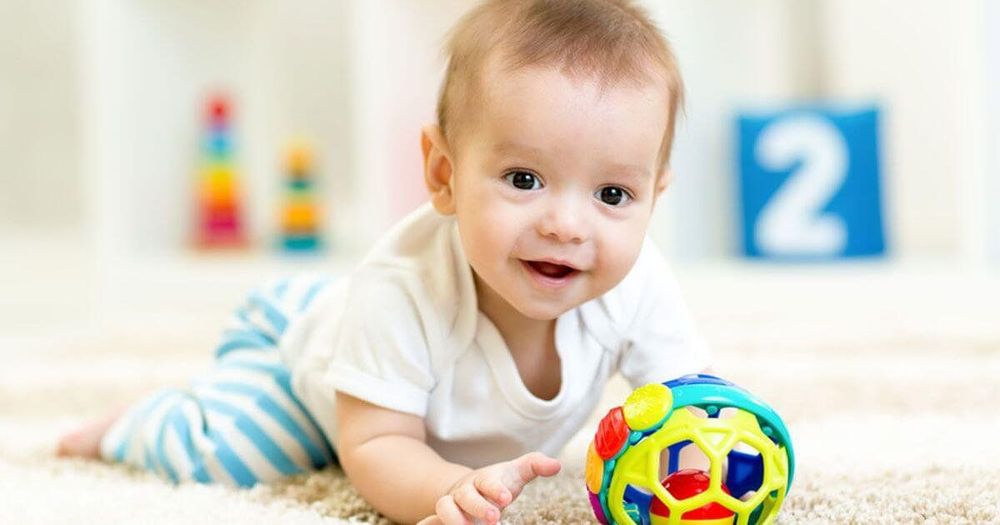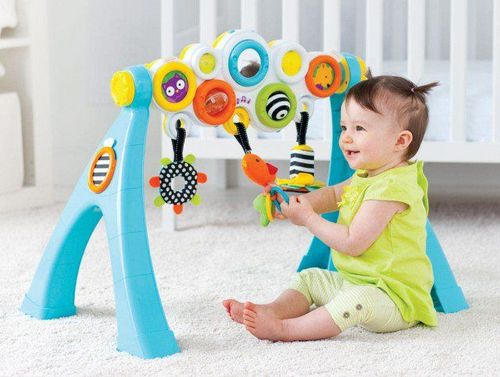This is an automatically translated article.
The article is professionally approved by Doctor Nguyen Thai Ngoc Chau - Department of Pediatrics - Neonatology - Vinmec Phu Quoc International General HospitalAnd Master, Doctor Huynh Bao Toan - Department of Pediatrics - Neonatology - Vinmec Nha Trang International General Hospital. The doctor has 13 years of experience in the field of Pediatrics.
At 35 weeks postpartum, your baby will have improved a lot in terms of motor development. Babies can feed themselves, and can also grasp small food items like spoons, forks and bowls, so encourage this as much as possible - it can help them eat better.
At this age, your child is also a good listener. And be sure to listen to every conversation you have with your baby and will try to imitate your voice and sounds. Children can also understand part of what you say, because they will respond to simple requests from parents. Children's cognitive skills are also greatly increased. In this article, we will provide useful information about the development of a 35-week-old baby and what parents can do to help their baby's development.
1. Development of a 35-week-old baby
Cognitive skills and motor skills, especially movement, will also develop significantly. Your child should be able to crawl around at a faster rate and stand up using the surrounding aids. Some children can even walk at this age, either using support or falling after a few steps. Either way, falling becomes a child's way of moving - so keep an eye on them.Your baby will be able to gain a sense of independence, when improved motor and movement skills combine. Babies are more likely to crawl to find a toy to get it themselves, rather than waiting for you to bring it out or crying to ask for it.
Cultivate the child's understanding of the world as much as possible, it is important that you talk to the child as much as possible. Children definitely listen to everything you say, so help them associate various words with their meanings.
2. Feed your 35-week-old baby
Your baby's feeding can change dramatically around this time. Due to the many developmental changes that occur in babies, babies may refuse to breastfeed. Because of this phenomenon, she and others advise the new generation of mothers to wean in this refusal - however, this is wrong. Breast milk is recommended for infants to be breastfed until two years of age.A baby who likes to eat during the day is suddenly "missing" - this happens due to distractions from other activities of the day and a number of other factors. Eating solid foods during the day is preferred by infants, and breast milk is preferred for children who are no longer active at night.

Cho bé 35 tuần bú mẹ là việc làm được các chuyên gia khuyến nghị
3. Put a 35 week old baby to sleep
In a 35-week-old baby, sleep disturbances occur frequently. This means that the child will not be able to sleep through the night without interruption and will wake up during the night crying for attention. Every time a baby experiences major developmental changes, it is common for a child to have an unstable sleep pattern. This is true in the case of teething, rolling, crawling and even standing.Sleeping through the night is a thing of the past, as the child inevitably wakes up at odd hours to get attention, they even serve as an alarm clock for constantly waking at a certain time their parents can't explain why. Co-sleeping will be a great idea at this stage, as it can help parents manage their children effectively without losing a lot of sleep. However, as the change happens gradually, you'll find your baby sleeps better at night. This means that after a few days, you'll be back to sleep - until the next developmental milestones arrive.
4. Tips for taking care of a 35-week-old baby
Here are a few tips that can help you manage your child and also help him improve his motor and mental skills.Talk to your baby as much as possible and try to name everything around him. This improves the child's understanding of the world, try associating sounds with something he sees around him. Also, call out the child's name as much as possible, so that the child gets the impression that that particular sound is somehow related to the child's identity Read the story to the child and change the tone of voice to reflect emotions as much as possible. This gives them an idea of voice patterns, and how sounds and tones are changed to convey different emotions. Listen to your baby as much as possible and try to interact with him through conversation. Give your baby the impression that you're listening intently to their babbling and responding in your own words, even if you don't understand their lovely language. If you think your child is asking for something, point to what he might want and ask him if he wants it and always wait for his response. Improve your child's motor skills by playing simple games with them, and let them move around the house as much as possible. However, make sure that your home is safe for your baby.

Cha mẹ có thể đọc truyện cho trẻ nghe ở khoảng thời gian 35 tuần tuổi
5. Games and activities for 35 weeks old baby
Games are extremely important for children at this age, as they can directly affect a child's cognitive and physical growth. During bath time, you can play water games and a few cups or toys. Show your baby how she can fill a cup or spoon with water and refill it in the tub. Encourage your baby to do it - this is a great way to improve your child's hand-eye coordination.Play some familiar music to your child and see if he recognizes these sounds. Soon your child will start 'singing' along with you, with a series of wonderful sounds that convey the delight.
You can also take your child outdoors a lot. Introduce your child to new things and name them. This not only helps to improve the child's spatial skills but also helps to form word associations in the child's mind.
6. Testing and vaccination for 35 weeks old baby
During this time, you may have been scheduled by your pediatrician to have certain vaccines, such as influenza, meningococcal B and C. Both vaccines can be used anytime between the ages of 6 months. However, all other major immunizations will be scheduled after the baby has passed one year of age.7. The 35-week-old milestone
Your baby will start interacting with you more, and so you will be able to play simple games with him. If you roll a ball to your child, he or she will roll it back to you - after giggling with delight. Your baby should be able to stand up by clinging to stationary objects, and may even be able to hold onto them and take a few steps. Baby babbling sounds like real conversation
Trẻ 35 tuần tuổi thích thú với những hành động yêu thương từ người thân
8. When to see a doctor?
As a mother, if you feel that something is wrong with your child's behavior, you will need some professional advice. Vaccinations are also a must, and if your child is affected by any illness, even if it's a simple cold, see your doctor and get expert advice.Your child is becoming a toddler now, with the ability to walk and talk starting to develop at a rapid rate. This is also when your baby is at his most playful, so make sure you spend plenty of time bonding with him and letting him do amazing things on his own. Enjoy this happy time with your children.
When the child has health abnormalities, parents can take the child to Vinmec Health system for timely examination and treatment.
A 35-week-old baby needs 5mg of elemental zinc/day to eat well, reach the correct height and weight and exceed the standard. Zinc plays a role in affecting most biological processes taking place in the body, especially the breakdown of nucleic acids, proteins... Organs in the body when zinc deficiency can lead to a There are a number of diseases such as neurological disorders, irritability, etc. Therefore, parents need to learn about the role of zinc and guide them to appropriate zinc supplements for their children.
In addition to zinc, parents also need to supplement their children with other important vitamins and minerals such as lysine, chromium, B vitamins,... errands.
Please regularly visit Vinmec.com website and update useful information to take care of your baby and family.
Reference source: parents.com; mamanatural.com














